In an otherwise excellent column on November 13, “The two immediate tests for Trump’s foreign policy,” Jackson Diehl strongly critiques Mr. Trump’s initial thinking towards the Syrian war. Specifically, he states that: “U.S. alignment with Russia will quickly alienate America’s Sunni allies such as Saudi Arabia and Jordan, which see the Syrian civil war as a proxy fight with Iran.” Just back from a trip to Amman during which I met with a number of high-ranking government officials, I am confident that this is in fact not the case, at least not in Jordan.
Burdened by 1.3 million Syrian refugees, or almost 20 percent of the nation’s own population, Jordan has an acute interest in seeing the civil war in Syria end. But it has deduced, after five years of watching the Obama administration seek to simultaneously defeat ISIS while pressuring President Assad out of power there, that it is important to have priorities. The U.S. approach has not worked. Even if it has gradually weakened ISIS, it has done nothing to weaken the al-Qaida derivative in Syria commonly called al-Nusra (now renamed the “Conquest of Syria Front” to mask those roots). Nor has it reduced the intensity of the civil war.
Indeed, without declaring this to be government policy, one official said to me that “there is a growing sense in the region that perhaps one is better off with the devil one knows”—meaning Assad, rather than a successor regime that could include jihadi elements, or the absence of any meaningful central government. Most of all, many express a willingness to consider new strategies and approaches at a time when the old way has clearly failed.
On November 10, the Post ran an excellent news story explaining that President Obama has recently authorized greater use of intelligence assets to gain information about the Conquest of Syria Front, so that the group can be attacked more effectively. Until just recently, the United States tolerated the Front, which is often intermixed on the battlefield with more moderate insurgent fighters. Recognizing how little pressure was otherwise being placed on the brutal Syrian dictator, the United States had been reluctant to go after the Front, even after agreeing last summer with Russia that we should in fact collectively take it on. In this context, Trump’s apparent willingness to attack both ISIS and the Front actually foreshadowed a decision that Obama was just about to make himself.
None of this is to express admiration for Mr. Trump’s foreign policy thinking, which in general I find underdeveloped at best, dangerous at worst. However, in regard to Syria in particular, there may be opportunities to work together with both Russia and regional states. And this is probably necessary. As another Jordanian official told me, “any solution likely requires cooperation with Russia.”
What both Trump, and Russia, and key regional actors need to appreciate is that Assad himself cannot of course be the answer.
Of course, it is not quite that simple. What both Trump, and Russia, and key regional actors need to appreciate is that Assad himself cannot of course be the answer. He may be the devil we know—but he is in fact a devil. Having killed most of the 400,000 or more who have died in this conflict and driven millions from their homes, Assad simply has too much blood on his hands to be a stabilizing and legitimate ruler of all of Syria ever again. He is despised by large segments of the Sunni Muslim majority in Syria, who have seen their neighborhoods shelled and barrel-bombed, and their populations deprived of food and medical care, for more than half a decade in this terrible war. We might temporarily defeat ISIS, only to see another wave of Salafist jihadism follow. And the war would go on.
So what kinds of longer-term strategies are available to us? Persuading Assad to step down in favor of a new, power-sharing government might be the theoretically most appealing approach. It has been U.S. policy for more than half a decade. However, it has gone nowhere. Perhaps things will change, but especially after the Russian intervention in the war last year, and resulting changes in battlefield momentum, Assad shows no interest in leaving office.
That leaves some type of territorial compromise as the most logical goal. If there will not be power-sharing within a strong central government, there can be power-sharing regionally. Such devolution of governance can take various forms. There could be one or two autonomous zones in some parts of the country (as with Kurdistan in Iraq), with Assad still in power in Damascus. Or there could be a new, relatively weak national government stitching together a federation or confederation of largely self-governing entities (as in Bosnia). There might even be a Swiss-style cantonment system.
Whichever solution is ultimately negotiated by Syrians with outside support, Assad’s future role would have to be limited to truly governing only those parts of Syria where Alawites and Christians are in the majority. My own view is that a formal confederation is the most militarily achievable and politically sustainable. In the end, Syrians can and must do the choosing, of course. But we owe them an open mind, and options. For five years, the international community has been assuming that only a strong central state, with a new government, can be the outcome of this conflict and negotiation process. That approach has been unduly restrictive. And it has failed miserably.
Achieving a stable outcome in Syria will require more than clever diplomacy and a willingness to attack both ISIS and the Conquest Front. The United States should still support moderate opposition fighters in this conflict. They have done too much—including to help defeat ISIS in the north, and helping to stabilize the Syrian-Jordanian border in the south—for us to abandon them. In fact, we need to do more to help them militarily. Otherwise, Assad and Russia will not agree even to a system of autonomy, or of confederation. We need both more diplomatic flexibility AND more military leverage.
So Mr. Trump is not wrong. But his view to date is incomplete, because collaboration with Putin cannot be the whole answer to solving our combined problems in Syria—and Assad as the future president of the whole country certainly cannot be the answer, either. A broader vision for what the future Syrian state can consist of, with more options, is needed soon. If Mr. Trump can embed his ideas for collaborating with Russia against ISIS and the Conquest of Syria Front within a broader strategy that aspires to the creation of a new type of Syria in which all groups have rights and safety in the future, his instincts might just help. It is too soon just to dismiss it out of hand.
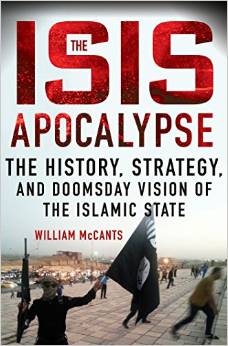
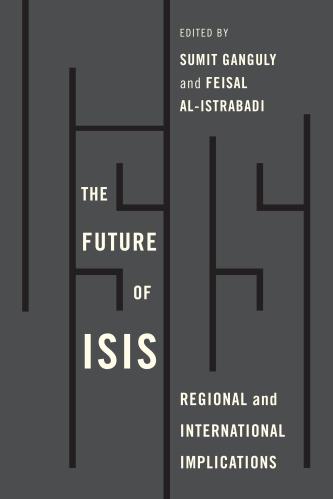


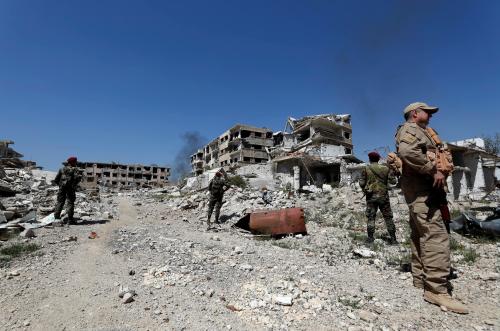
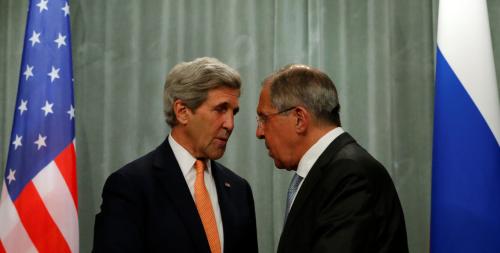

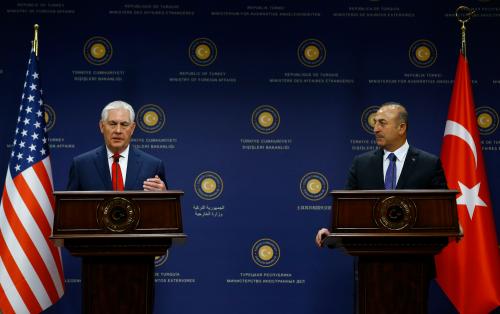
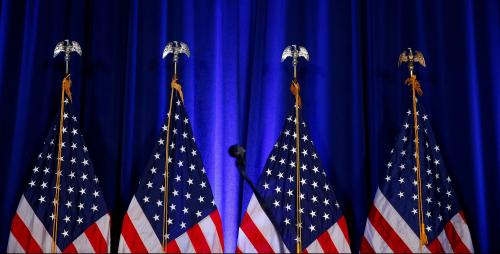
Commentary
Trump’s instincts on Syria are partially right
November 23, 2016